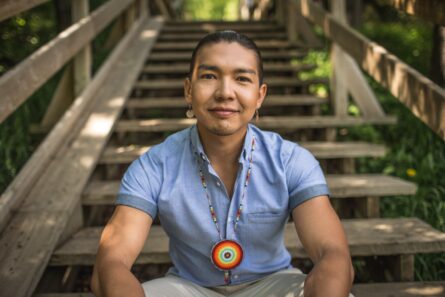
On Oct. 8, McGill kicks off its seventh edition of Queer History Month (QHM), a time to recognize the history and achievements of 2S/LGBTQIA+ communities at the University and beyond.
The keynote address will be delivered by Dr. James A. Makokis. Though some may recognize him as a winner of The Amazing Race Canada, he is also renowned for his leadership in opening one of the most progressive family medical clinics, serving 2S/LGBTQIA+ individuals and Indigenous Peoples.
“Dr. Makokis is a trailblazer in Indigenous health, transgender health and culturally sensitive care. He has authored works that have had a significant impact on the way we think of the fundamental needs of patients to be accepted and respected for who they are,” said Lesley Fellows, Vice-Principal (Health Affairs) and Dean of the Faculty of Medicine and Health Sciences.

The Department of Family Medicine and the Indigenous Health Professions Program have been notable collaborators in organizing this year’s edition of QHM. With support from the Office of Indigenous Initiatives, they look forward to welcoming Dr. Makokis, who is a member of the Saddle Lake First Nation, in Northern Alberta.
“Dr. Makokis is a vocal supporter of 2S/LGBTQIA+ rights and visibility, himself identifying as Two-Spirit. Because of his work in education and inclusivity, we are delighted he will be delivering the keynote at this year’s Opening Ceremony,” said Shannon Wood, lead QHM organizer in the Team.
Keeping progress visible
“Knowing that members of the 2S/LGBTQIA+ community continue to experience greater violence, harassment, and discrimination, both in public and at work, compared to cisgender and straight people, makes QHM more relevant now than ever,” said Wood.
Wood is confident that this year’s increased programming, complementing the Equity Team’s offerings, will provide additional opportunities for McGill’s diverse communities to engage in and celebrate this important month.
“Our goal is to encourage University-wide participation in QHM through department initiatives as well as the Equity Team’s programing,” Wood said.
Events led by other McGill units include:
- A workshop titled “Fostering Equitable and Inclusive Learning Environments: Change One Thing!” offered by Teaching and Learning Services.
- A button-making session to foster community and to create a piece of wearable pride, hosted by the Wellness Hub.
- A panel discussion on the impact of AI on 2S/LGBTQIA+ identity, hosted by Web Services.
- Queer History Month Peer Study Groups, every Thursday in October, as part of the Stay on Track
Queer History Month’s own history
McGill’s QHM may only date back to October 2018, but it was the first such initiative among Canadian universities. Former Equity Education Advisor Meryem Benslimane spearheaded the initiative, initially under the name “LGBTQ2I+ History Month.” Since then, it has featured a range of events, from film screenings to panel discussions to various types of workshops, often geared to the needs of the academic milieu. At the same time, QHM maintains a strong community focus and awareness of issues that span beyond campus settings
“During this ongoing period of backlash against queer and trans people, both locally and globally, it is critical that we are clear as an institution about our broad-reaching commitments to 2SLGBTQIA+ communities,” said Tynan Jarrett, Director, Equity, Diversity and Inclusion.
“The 2024 QHM program is a small but important piece of this work, and one that I am extremely proud of.
To learn more about QHM and find the calendar of events and registration links, please visit the 2024 webpages.
